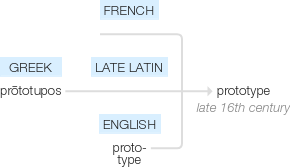Prototype
late 16th century (denoting the original of which something else is a copy or derivative): via French or late Latin from Greek prōtotupos (see proto-, type).
wiktionary
From French prototype or Late Latin prototypon, [1] from Ancient Greek πρωτότυπος(prōtótupos, “original; prototype”), [2] from πρωτο-(prōto-, “prefix meaning ‘first’”) (from πρῶτος(prôtos, “first; earliest”)) + τῠ́πος(túpos, “blow, pressing; sort, type”) (from τύπτω(túptō, “to beat, strike”), from Proto-Indo-European *(s)tewp-(“to push; to stick”)). The word is analysable as proto- + -type.
etymonline
prototype (n.)
"a primitive form, original, or model after which anything is formed," c. 1600, from French prototype (16c.) and directly from Medieval Latin prototypus "original, primitive," from Greek prōtotypon "a first or primitive form," noun use of neuter singular of prōtotypos "original, primitive," from prōtos "first" (see proto-) + typos "impression, mold, pattern" (see type (n.)). In English from 1590s as prototypon.
